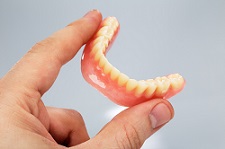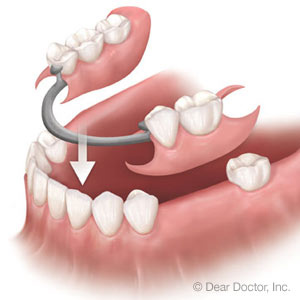Dentures in Noblesville, IN
Advantages of Dentures
Are you considering visiting Dr. Meghan Potee for complete or partial dentures? High quality dentures offer a number of fantastic benefits you'll definitely want to consider for tooth replacement.
Restore Mouth Function
Stop avoiding your favorite foods. Today's strong dentures allow you to properly chew all of the foods you haven't been able to enjoy in a while. Whether it's apples, chips or nuts, there are some foods you simply need a proper set of teeth to eat.
Restore Your Beautiful Smile
Missing teeth can make smiling embarrassing and uncomfortable. Stop hiding your smile with a quality set of new dentures from Dr. Meghan Potee. Your new smile will look so natural and beautiful, you won't be able to stop showing it off to everyone you meet.
Improve Your Overall Health
Teeth aren't just important for eating and smiling; they also provide the structure that your mouth needs to retain its shape. Dentures are a great way to support your facial muscles and structures and to decrease your oral bone loss so your entire face continues looking great.
Types of Dentures
Complete dentures: replace all the teeth, while a partial denture fills in the spaces created by missing teeth and prevents other teeth from changing position. Candidates for complete dentures have lost most or all of their teeth.

A partial denture: is suitable for those who have some natural teeth remaining. A denture improves chewing ability and speech, and provides support for facial muscles. It will greatly enhance the facial appearance and smile.
Complete or full dentures are made when all of your natural teeth are missing. You can have a full denture on your upper or lower jaw, or both.

Complete dentures are called "conventional" or "immediate" according to when they are made and when they are inserted into the mouth. Immediate dentures are inserted immediately after the removal of the remaining teeth. To make this possible, the dentist takes measurements and makes the
models of the patient`s jaws during a preliminary visit. An advantage of immediate dentures is that the wearer does not have to be without teeth during the healing period. However, bones and gums can shrink over time, especially during the period of healing in the first six months after the removal of teeth. When gums shrink, immediate dentures may require rebasing or relining to fit properly. A conventional denture can then be made once the tissues have healed. Healing may take at least 6-8 weeks. An overdenture is a removable denture that fits over a small number of remaining natural teeth or implants. The natural teeth must be prepared to provide stability and support for the denture.
Partial dentures are often a solution when several teeth are missing. Removable partial dentures usually consist of replacement teeth attached to pink or gum-colored plastic bases, which are connected by metal framework. Removable partial dentures attach to your natural teeth with metal clasps or devices called precision attachments. Precision attachments are generally more esthetic than metal clasps and are nearly invisible. Crowns on your natural teeth may improve the fit of a removable partial denture and they are usually required with attachments. Dentures with precision attachments generally cost more than those with metal clasps.
Getting Used to Your Denture
For the first few weeks, a new denture may feel awkward or bulky. However, your mouth will eventually become accustomed to wearing it. Inserting and removing the denture will require some practice. Your denture should easily fit into place. Never force the partial denture into position by biting down. This could bend or break the clasps. At first, you may be asked to wear your denture all the time. Although this may be temporarily uncomfortable, it is the quickest way to identify those denture parts that may need adjustment. If the denture puts too much pressure on a particular area, that spot will become sore. Your denture can be adjusted to fit more comfortably. After making adjustments, you may need to take the denture out of your mouth before going to bed and replace it in the morning. Start out by eating soft foods that are cut into small pieces. Chew on both sides of the mouth to keep even pressure on the denture. Avoid sticky or hard foods, including gum. You may want to avoid chewing gum while you adjust to the denture.
Taking Care of Your Denture
It's best to stand over a folded towel or a sink of water when handling your denture, just in case you accidentally drop it. Brush the denture (preferably with a denture brush) daily to remove food deposits and plaque, and keep it from becoming permanently stained. Avoid using a brush with hard bristles, which can damage the denture. Look for denture cleansers with the American Dental Association (ADA) Seal of Acceptance. Pay special attention to cleaning teeth that fit under the denture`s metal clasps. Plaque that becomes trapped under the clasps will increase the risk of tooth decay. Hand soap or mild dish washing liquid to clean dentures is also acceptable. Other types of household cleaners and many toothpastes are too abrasive and should not be used for cleaning dentures. A denture could lose its proper shape if it is not kept moist. At night, the denture should be placed in soaking solution or water. However, if the appliance has metal attachments, they could be tarnished if placed in soaking solution. Even with full dentures, you still need to take good care of your mouth. Every morning, brush your gums, tongue and palate with a soft-bristled brush before you put in your dentures. This removes plaque and stimulates circulation in the mouth. Selecting a balanced diet for proper nutrition is also important for maintaining a healthy mouth.
Appliance Adjustments
Over time, adjusting the denture may be necessary. As you age, your mouth naturally changes, which can affect the fit of the denture. Your bone and gum ridges can recede or shrink, resulting in a loose-fitting denture. Loose dentures can cause various problems, including sores or infections. Dentures that do not fit properly can be adjusted. Avoid using a do-it-yourself kit to adjust your dentures, as this can damage the appliance beyond repair. Glues sold over-the-counter often contain harmful chemicals and should not be used on a denture. If your denture no longer fits properly, if it
breaks, cracks or chips, or if one of the teeth becomes loose, see your dentist immediately. In many cases, dentists can make necessary adjustments or repairs, often on the same day. Complicated repairs may require that the denture be sent to a special dental laboratory. Over time, dentures will need to be relined, re-based, or re-made due to normal wear. To reline or re-base a denture, the dentist uses the existing denture teeth and refits the denture base or makes a new denture base. Dentures may need to be replaced if they become loose and the teeth show signs of significant wear.
Common Concerns
Eating will take a little practice. Start with soft foods cut into small pieces. Chew slowly using both sides of your mouth at the same time to prevent the dentures from tipping. As you become accustomed to chewing, add other foods until you return to your normal diet. Continue to chew food using both sides of the mouth at the same time. Be cautious with hot or hard foods and sharp-edged bones or shells. Some people worry about how dentures will affect their speech. Consider how your speech is affected when you have a number of your natural teeth missing. Pronouncing certain words may require practice. Reading out loud and repeating troublesome words will help. If your dentures "click" while you`re talking, speak more slowly. You may find that your dentures occasionally slip when you laugh, cough or smile. Reposition the dentures by gently biting down and swallowing. If a speaking problem persists, consult your dentist.
Denture Adhesives
Denture adhesives can provide additional retention for well-fitting dentures. Denture adhesives are not the solution for old, ill-fitting dentures. A poorly fitting denture, which causes constant irritation over a long period, may contribute to the development of sores. These dentures may need a reline or need to be replaced. If your dentures begin to feel loose, or cause pronounced discomfort, consult with your dentist immediately.
Do you need Dentures or would like to learn more?
Then call our Noblesville, IN location at (317) 773-0883 today for more information or to book an appointment!

